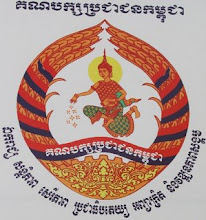Having come to power through cunning means, the Abhisit’s Government pulled Thai-Cambodian diplomatic relations down to the lowest level that has never seen under the previous Thai premiership since 1991. On November 5, 2009, Abhisit called Thai Ambassador back to Bangkok on the pretext that the Royal Government of Cambodia appoints His Excellency Thaksin Shinawatra as its economic advisor and advisor to Samdech Techo Hun Sen. The act of recalling Ambassador has caused tremendous blow on the cooperation between the two nations and is countering to the common political tendency of ASEAN. To put issue straight here all is not because the appointment of HE Thaksin but the invasion by the Thai army on July 15, 2008 on the Cambodian territory, a week after the World Heritage Committee registered the Cambodian Preah Vihear temple as one of the world heritages on July 7, 2008. The invasion has had a clear objective that is to divert attention of the Thai public from internal conflict to issue of Preah Vihear and to provide stronger ground for the opposition groups in Cambodia - all to implement the policy of expansionism ever applied in the past.
The Thai army opened attack and invaded Cambodia four times – October 3, 2008; October 15, 2008; December 21, 2008 and April 3, 2009 – causing the border situation to a more complicated level. Use of forces for invasion of Cambodia has downgraded the Abhisit Government’s dignity, and not less being strongly condemned by the public opinion. More so, the Abhisit Government declares annulment of cooperation between Thailand and Cambodia. They nullified the MOU of 2001, while continuing to propose a revising of the Preah Vihear temple’s registration and obstructing openly to the proposition of Cambodian candidacy as a member of the World Heritage Committee. They have driven for a stealing of Thaksin’s flight schedule and itinerary from Cambodia, which is a gross state-to-state espionage. They have pulled up, in a confidential letter of the Thai Foreign Affairs Ministry dated December 15, 2009, different scenarios that include their state of being prepared for an open war with Cambodia, a coup in Cambodia and a collusion for killing Thaksin, who is also a Thai and the advisor of the Royal Government of Cambodia. At the same instance, the Abhisit’s Government has threatened to close border passes putting a halt to trades between the two countries, an act that would cause greater impact for Thai people than to the Cambodians if it were to be enforced. All the abovementioned acts are a gross violation of the international law, whereas it is as clear that the Abhisit’s Government represents no true will and interest of the Thai people. It is nothing but a nature of a Government that is not born out of a true democratic means.
In tandem with a common political tendency of ASEAN as well as the world trend, the Kingdom of Cambodia always adheres strictly to the policy of peace, friendship and cooperation with Thailand with an intention to transform the borderline areas between the two countries into development that serves for economic, trade and social progress. The era of economic blockade already elapsed, and more so the use of force to solve conflict. Isolation and discrimination are no longer in tandem with the current world trend. Interdependence in economics and trades is a necessary condition for each country’s development, especially those who conduct their business along the border between Cambodia and Thailand, aimed at reducing poverty among people who are living in the area and maintaining a sustainable peace. This is a clear and straightforward position of the Royal Government of Cambodia.
The Cambodian leaders have brought Cambodia from a warflame to being a country of peace, political stability, better social security and order that are uniting and energetically developing Cambodia as a nation. The Kingdom of Cambodia wishes for peace and would do everything it could to strengthen and expand cooperation in all fields with its neighbors and other countries in the region as well as in the world. It should be noted that the Abhisit’s Government is running counter to this current as they don’t contemplate with the regional trend, while shaping a culture of violation on the ASEAN charter and the ASEAN Treaty of Amity, the spirit of the Agreement on Defense and Maintaining Regional Security among Member Countries of ASEAN, especially that of the so-far achieved Agreements between Foreign Ministers and between the Committees in Charge of Border Affairs of the two countries – Cambodia and Thailand.
The Cambodian people, under the leadership of the Royal Government of Cambodia headed by Samdech Akka Moha Sena Padei Techo Hun Sen, are resolutely determined to defend every inch of its sovereignty and territorial integrity. Since when the country has been under aggression from the Thai army, the Cambodian people strengthen more their national unity around the Royal Government and share their sentiments with our armed forces standing guard the fatherland. This has clearly indicated a strong and unbending will of our people in putting any aggressive ambition to doom .





No comments:
Post a Comment